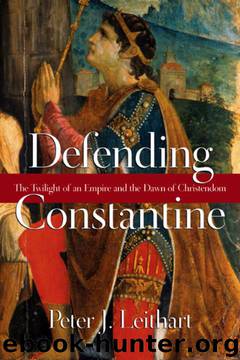Defending Constantine: The Twilight of an Empire and the Dawn of Christendom by Peter J. Leithart

Author:Peter J. Leithart [Leithart, Peter J.]
Language: eng
Format: epub
Tags: Non-Fiction
Amazon: B004AP9RSW
Publisher: IVP Academic
Published: 2013-10-17T04:00:00+00:00
He was a mighty man who brought to pass whatever he attempted. He strove for mastery over the entire world.
EUTROPIUS, BREVIARUM HISTORIAE ROMANAE 10.41
On March 25, A.D. 101, the emperor Trajan (98-117) set out with four legions on a military expedition against the Dacians, who inhabited a region stretching east from the Pannonian Plains across the Carpathians to the Black Sea.2 At forty-two, Trajan was at an ideal age for such a campaign, free from both the "recklessness of youth and the sluggishness of old age." Besides that, he took as much "delight in war" as in wine and boys. The Dacians "had good cause to fear him."
During his preparations for battle, someone brought him a large mushroom bearing a Latin inscription written by some of Rome's allies, warning him to turn back. Ignoring the warning, he threw himself into the battle, losing men and killing many Dacians. Bandages gave out, and Trajan tore strips from his own clothing to bind up the wounded. Finally, the Dacian king Decebalus came out, fell to the ground and did obeisance to the Roman emperor, promising to cast aside his arms and befriend Rome. Trajan assumed the title Dacicus and inscribed it on coins; he celebrated his triumph in Rome, complete with gladiatorial combats. It seemed a satisfying conclusion.
Decebalus had not given up. Even as many Dacians were submitting to Trajan, Decebalus gathered troops and arms and raised assistance from surrounding nations. He sent some Roman deserters to assassinate Trajan, but they were captured, and they confessed under torture. He invited the Roman commander Longinus to conference, but when he arrived, Decebalus had him arrested and questioned him about Trajan's plans. Longinus frustrated that effort by drinking poison.
Trajan could not let these insults stand. Roman honor was at stake. By 105, he had constructed a massive bridge over the Danube and crossed into Dacian territory. Several detachments from Trajan's army converged on the capital, Sarmizegetuza, destroying fortresses as they went. At the capital, they laid siege. The Dacians resisted, but the Roman war machines were too strong. They blocked the water supply and, after permitting the Dacians to leave, set fire to the city, acclaimed Trajan in the sacred center, and destroyed the fortress. Trajan occupied all the territory of Decebalus, and the latter, seeing he had no chance of winning, fled into the mountains. When the Romans pursued, Decebalus acted like a Roman and committed suicide. Trajan brought his head back to Rome, along with treasures-nearly forty tons of gold and twice as much of silver-discovered in a cave submerged under water that Decebalus had diverted from the Sargetia River. Trajan "drove out or destroyed a large number" of Dacians and resettled the territory with Roman veterans and people from the East.'
There was a backstory. Romans believed that "conquest was a good and glorious thing" and considered "desire for a title, a triumph, or a glorious reputation" to be "a perfectly plausible explanation for war."4 Trajan went on to fight back a
Download
This site does not store any files on its server. We only index and link to content provided by other sites. Please contact the content providers to delete copyright contents if any and email us, we'll remove relevant links or contents immediately.
The Gnostic Gospels by Pagels Elaine(2531)
Jesus by Paul Johnson(2363)
Devil, The by Almond Philip C(2333)
The Nativity by Geza Vermes(2231)
The Psychedelic Gospels: The Secret History of Hallucinogens in Christianity by Jerry B. Brown(2158)
Forensics by Val McDermid(2094)
Going Clear: Scientology, Hollywood, and the Prison of Belief by Lawrence Wright(1985)
Going Clear by Lawrence Wright(1968)
Barking to the Choir by Gregory Boyle(1822)
Old Testament History by John H. Sailhamer(1816)
Augustine: Conversions to Confessions by Robin Lane Fox(1774)
The Early Centuries - Byzantium 01 by John Julius Norwich(1745)
A History of the Franks by Gregory of Tours(1729)
A Prophet with Honor by William C. Martin(1726)
Dark Mysteries of the Vatican by H. Paul Jeffers(1723)
The Bible Doesn't Say That by Dr. Joel M. Hoffman(1681)
by Christianity & Islam(1636)
The First Crusade by Thomas Asbridge(1610)
The Amish by Steven M. Nolt(1574)
